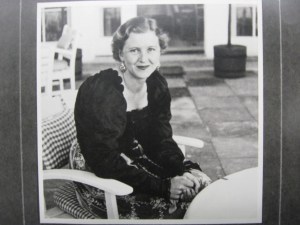Phyllis Edgerly Ring's Blog, page 31
February 8, 2015
Leaving space enough

Photo: David Campbell / http://gbctours.com
Patience is a personal focus, right now.
And poet friend Bob Moore speaks right to my soul with this reminder about the wisdom of our tree sisters and brothers.
They seem to know how to leave generous room for mystery to come in quietly and fill the spaces.
Patience
by Bob Moore

Photo: Nelson Ashberger
The trees stood still. They knew enough to wait.
They knew that every season wasn���t great
for blooming, so they slowed down, and they dreamed
of what the light would feel like when it streamed
for hours in the warmth of a summer day.
When asked if they felt cold, they wouldn���t say.
But given the chance, they wore a coat of snow,
and waited for the length of days to grow.
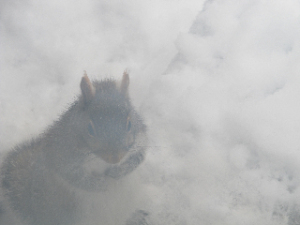
Photo: https://www.etsy.com/shop/DKirkupDesigns
They watched the squirrels and chipmunks fetch their meals,
but never spoke a word of how it feels
to while away the time and not complain,
or worry if the forest would sustain
their young, or fret about the need for room.
Instead, they held out for a chance to bloom.

February 6, 2015
On the trail of Mrs. Hitler
February’s the month in which two characters in the novel I’m about to publish share a birthday.
Like me, all three women in The Munich girl have strong connections with Germany, where two of them meet just before World War II.
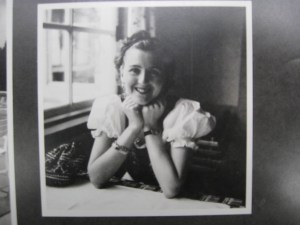 Peggy, is a Leap-year baby with ���29 February��� on her birth certificate. That kind of thing can make you feel like a fictional character right out of the starting gate.
Peggy, is a Leap-year baby with ���29 February��� on her birth certificate. That kind of thing can make you feel like a fictional character right out of the starting gate.
Eva Braun, always wanted to live the life of a character in a movie or novel. However, as many women have, and still do, she gives her life away to someone who hasn’t the capacity to value it, or, it would seem, to care for humanity at all.
“Did she really love him? How could she ever love him?” are questions I hear frequently about the woman who became “Mrs. Hitler” for the last day and a half of her life.
 Anna, the story’s narrator grew up eating dinner under her father���s war-trophy portrait of Eva Braun. Fifty years after the war, she discovers what he never did���that her mother, Peggy, and Hitler���s mistress were friends. The secret surfaces with a mysterious monogrammed handkerchief and a man named Hannes Ritter, whose Third-Reich family history is entwined with her own.
Anna, the story’s narrator grew up eating dinner under her father���s war-trophy portrait of Eva Braun. Fifty years after the war, she discovers what he never did���that her mother, Peggy, and Hitler���s mistress were friends. The secret surfaces with a mysterious monogrammed handkerchief and a man named Hannes Ritter, whose Third-Reich family history is entwined with her own.
These lead her (much as I’ve been led) into the world of the ���ordinary��� Munich girl who became a tyrant���s consort and her mother���s confidante. As she retraces a friendship that began when two lonely teenagers forged a bond that endured throughout the war, even though the men they loved had opposing ambitions, Anna realizes that she has suppressed her own life nearly as much as Hitler���s mistress did. Ultimately she and Hannes discover how the love in one friendship echoes on in two families until it unites them at last.
It’s a grace to have stories come to find me and, like a kind and patient companion, stay with me, until I catch up with them to find the way home to the finish.
 In the instance of this novel, the story began by dropping clues, two of the biggest, a handkerchief just like the one Anna finds — and the portrait of Eva Braun, which, somehow, found me, too. It’s what made the process unstoppable, a path that has unrolled itself before me over the last seven years and seems to have recreated my own life, from the inside-out.
In the instance of this novel, the story began by dropping clues, two of the biggest, a handkerchief just like the one Anna finds — and the portrait of Eva Braun, which, somehow, found me, too. It’s what made the process unstoppable, a path that has unrolled itself before me over the last seven years and seems to have recreated my own life, from the inside-out.
 Because of that, something memoir-like about this novel’s coming into being is a likely next step. Also, because of the amount of response I’ve received about Eva Braun’s story as a motif for looking at women’s lives, and the state of our world, a work about her seems inevitable, too.
Because of that, something memoir-like about this novel’s coming into being is a likely next step. Also, because of the amount of response I’ve received about Eva Braun’s story as a motif for looking at women’s lives, and the state of our world, a work about her seems inevitable, too.
If you would like to join the mailing list for notifications about these upcoming books, please send a message to:
info@phyllisring.com
Coming soon: The Munich girl: A Novel of the Legacies That Outlast War

February 4, 2015
Truth’s path is Oneness
“The root cause of prejudice is blind imitation of the past ��� imitation in religion,
in racial attitudes, in national bias, in politics.”
 “The greatest cause of bereavement and disheartening in the world of humanity is ignorance based upon blind imitation. It is due to this that wars and battles prevail; from this cause hatred and animosity arise continually among mankind. As long as imitation persists, strife and contention will destroy the purpose of religion and make love and fellowship impossible.”
“The greatest cause of bereavement and disheartening in the world of humanity is ignorance based upon blind imitation. It is due to this that wars and battles prevail; from this cause hatred and animosity arise continually among mankind. As long as imitation persists, strife and contention will destroy the purpose of religion and make love and fellowship impossible.”
“The underlying reality of the world���s religions is one, but the corrosive effects of imitation prevent a realization of the awareness of their common foundation.”
“Ideas and beliefs left by … fathers and ancestors as a heritage will not suffice, for adherence to these are but imitations, and imitations have ever been a cause of disappointment and misguidance.”
“Be investigators of reality that you may attain the verity of truth and life.”
 “It is now possible for us to come into awareness that the source of all evil, blind imitation, can be eliminated through the investigation of reality. The process of eliminating blind imitation in our lives takes place reaction by reaction.”
“It is now possible for us to come into awareness that the source of all evil, blind imitation, can be eliminated through the investigation of reality. The process of eliminating blind imitation in our lives takes place reaction by reaction.”
“Every individual member of humankind is exhorted … to set aside superstitious beliefs, traditions and blind imitation of ancestral forms in religion and investigate reality for himself.”
“Inasmuch as the fundamental reality is one, all religions and nations of the world will become one through the investigation of reality. The announcement of this principle is not found in any of the sacred Books of the past.”
Quoted passages from ���Abdu���l-Bah��, Promulgation of Universal Peace, 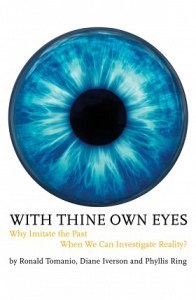
excerpted from
With Thine Own Eyes: Why Imitate the Past, When We Can Investigate Reality?
��Find the book at: http://www.amazon.com/With-Thine-Own-Eyes-Investigate-ebook/dp/B00I1JPC7I/ref=pd_sim_kstore_11?ie=UTF8&refRID=0TQC490J7FVBRTJWM70H
Also available in print version from: http://www.bahairesources.com/with-thine-own-eyes.html
��
��

February 1, 2015
The treasures in the moments
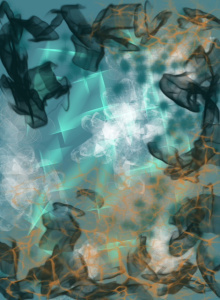
Image: Judy Hughey Wright
GLEANINGS FROM HERE AND THERE:
You do not need to know precisely what is happening, or exactly where it is all going. What you need is to recognize the possibilities and challenges offered by the present moment, and to embrace them with courage, faith, and hope.
~ Thomas Merton
The Universe does not know whether the vibration that you’re offering is because of something you’re observing or something you’re remembering or something that you are imagining. It just receives the vibration and answers it with things that match it.
~ Abraham-Hicks
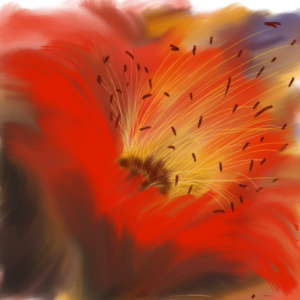
Image: Judy Hughey Wright
Simplicity, patience, compassion.
These three are your greatest treasures.
Simple in actions and thoughts, you return to the source of being.
Patient with both friends and enemies,
you accord with the way things are.
Compassionate toward yourself,
you reconcile all beings in the world.��
~ Lao Tzu, Tao Te Ching
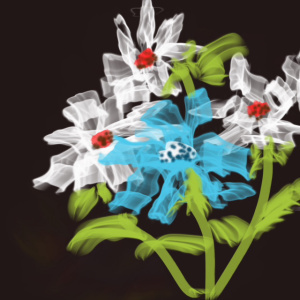
Image: Judy Hughey Wright
O God
Whenever I listen
to the voice of anything you have made ���
The rustling of the trees
The trickling of water
The cries of the birds
The flickering of shadow
The roar of the wind
The song of the thunder,
I hear it saying:
God is One!
Nothing can be compared with God!
~ Rabi���a�� 717���801, Sufi saint, woman mystic

January 29, 2015
“In times of war and deprivation …”
As scenes, and themes, of hunger envelop my current novel-in-progress, this writer’s Guest Post is a glimpse of history – and hunger – from the branches of our own family tree: 
The measure of a moral compass
By Tracey Edgerly Meloni
Nana���s last ration book, bilious green and brittle, is pasted to the inside cover of her journal. Rationing in the UK continued until 1954 ��� July 4 – and defined three generations of my family, for better or for worse. Now, it seems the hand of ���democratic deprivation��� touches ��� teaches? ��� six-year-old me.
 Holding it, feeling it, I am engulfed in memories that are not mine, but are as deeply embedded as if they were. All my short life I have heard about the evacuees from London and Birmingham that filled The Chantry, the Victorian Gothic-horror house where eventually I was born in England���s Lake District. Retold stories of GranNana ���tsking��� over the poor quality of coal available to heat the house while she supervised the hanging of ���ill-fitting��� blackout drapes, lamenting in her ladylike way the conversion of nearby Shap Wells resort into a POW camp for upper echelon German officers. I recall Nana joining the chorus: ���We managed on one egg a week while the best provisions sailed past bound for ���Those Germans���.���
Holding it, feeling it, I am engulfed in memories that are not mine, but are as deeply embedded as if they were. All my short life I have heard about the evacuees from London and Birmingham that filled The Chantry, the Victorian Gothic-horror house where eventually I was born in England���s Lake District. Retold stories of GranNana ���tsking��� over the poor quality of coal available to heat the house while she supervised the hanging of ���ill-fitting��� blackout drapes, lamenting in her ladylike way the conversion of nearby Shap Wells resort into a POW camp for upper echelon German officers. I recall Nana joining the chorus: ���We managed on one egg a week while the best provisions sailed past bound for ���Those Germans���.���
My mother took up shooting rabbits for meat ��� ���I���m not eating another revolting mouthful of bloody whale, and you���ll not convince me SPAM is meant to be eaten by humans. I���d rather wait for horsemeat.��� 
The ���Land girls��� made sure they ��� I can���t help but think ���we��� – had plenty of vegetables and developed recipes to make them palatable in the absence of butter and onions. Most treasured, and missed, were bacon, butter, cream and whole milk. Till the day they died, my forebear-women would not tolerate margarine, powdered milk or the dreaded peanut butter (used as a less-than-successful shortening in wartime baked goods).
Sharing the shortages was a red badge of courage. Rationing was good for all.
Mostly…
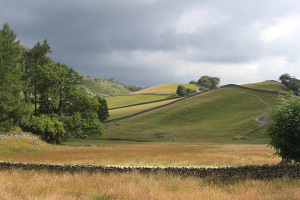
Photo: Kathy Gilman
All the women spoke gleefully of the alligator shoes, a size too small, my mother found for 100 pounds (!!) on the black market. No one chastised Mr. Dixon-Hunter for siphoning petrol from unwitting��hotel visitors. The tale of Rodney, the ill-gotten pig, hidden and slaughtered for a village Guy Fawkes Day feast, is still cheerfully ballyhooed.
Uncle Willie, my Godfather, who fought in a ghastly conflict no one mentions, sees my untutored ethical struggle. He smells of Pear���s soap and Players cigarettes and ginger. I love him very much.
 ���In time of war and deprivation,��� he says earnestly, looking into my eyes, ���our moral compasses may venture off true north.���
���In time of war and deprivation,��� he says earnestly, looking into my eyes, ���our moral compasses may venture off true north.���
Years will pass before I grasp his meaning, but the words remained as indelibly etched as the brittle feel of the ration book.

January 25, 2015
Awareness needs both giving and receiving

Photo: Kathy Gilman
Can I recognize in my encounters with imperfection an invitation to accept that there is much I don���t know, or can���t change, especially about others?
How might I discover the limitless possibilities of love, of being open to the new possibilities in a situation or a moment? Might willingness to meet the present, rather than automatically imitate or recreate the past, be what it most truly means to “occupy” my self?
 The two service questions are conceived as a mechanism to help me focus on and clarify reality for myself in the decisions with which I am faced each day. Those junctures of possibility arrive moment by moment, and the goal of this pair of questions is to help me meet each one consciousl:
The two service questions are conceived as a mechanism to help me focus on and clarify reality for myself in the decisions with which I am faced each day. Those junctures of possibility arrive moment by moment, and the goal of this pair of questions is to help me meet each one consciousl:
~ At this moment in time, what is the act of service I am capable of giving that the other person is capable of receiving?
~ At this moment in time, what is the act of service I am capable of receiving that the other person is capable of giving?
 Every human interaction is either an act of giving or an act of receiving. By asking questions that encompass both giving and receiving, my sensitivity to and awareness of my own needs and those of others is increased daily. Both questions are equally important because giving depends on someone willing and capable of receiving, and receiving depends on someone willing and capable of giving.
Every human interaction is either an act of giving or an act of receiving. By asking questions that encompass both giving and receiving, my sensitivity to and awareness of my own needs and those of others is increased daily. Both questions are equally important because giving depends on someone willing and capable of receiving, and receiving depends on someone willing and capable of giving.
Adapted from With Thine Own Eyes: Why Imitate the Past, When We Can Investigate Reality?
Find the book at: http://www.amazon.com/With-Thine-Own-Eyes-Investigate-ebook/dp/B00I1JPC7I/ref=pd_sim_kstore_11?ie=UTF8&refRID=0TQC490J7FVBRTJWM70H
Also available in print version from: http://www.bahairesources.com/with-thine-own-eyes.html


January 23, 2015
Devotee to the delight of discovery
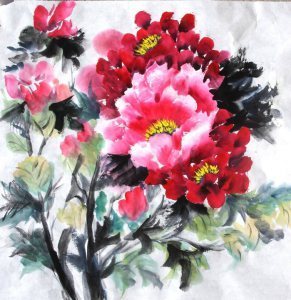
Artwork: Judy Hughey Wright
The greatest gift in creative process may be the way in which it leads so naturally — and enjoyably — to the harmonizing of heart and mind.
Show up for any blank page, canvas, or other creative endeavor and it quickly becomes obvious just how much our heart and mind are designed to be collaborators on a journey of learning, and expression, in service to truth. A lot of cultural influences set heart and mind against each other as adversaries, which may explain a lot of anguish in human experience.
In reality, the process of creating anything requires the harmonizing and partnership of these aspects of ourselves in a dynamic coherence and balance. And — the paradoxical bonus, if we’re brave enough to step onto the high wire of creating, which often has so much of the unknown looming underneath — is that it feels good. And so do we, when we experience it. Because wholeness is what we’re made for, and, mercifully, we can’t do it wrong.

Image: https://www.etsy.com/shop/DKirkupDesigns
Immersed in a book���s writing process again, I���m reminded that faithfulness to this process involves being present to discover what is ready to be revealed, and what I am ready to receive, rather than trying to force or impose anything. There is an invitation here, which, like any invitation, asks me to accept and receive it on its terms, rather than any agenda or desired outcome of mine.
When I’m able to comply, what comes to meet me feels powerful and also mysteriously subtle; encircling, and, at the same time, wholly liberating. It feels something like what life is meant to be, rather than what so much unhelpful information tries to convince us that it is.
A recent study that’s getting a lot of mileage right now describes how the experience of writing (and we could substitute any creative experience that attracts us) can lead to a greater sense of happiness and personal meaning. When the study engaged participants in writing activities, it found that they were shifted “from a self-defeating way of thinking into a more optimistic cycle that reinforces itself,��� according to Timothy D. Wilson, University of Virginia psychology professor and lead author of the study.
Creative process apparently not only helps us feel better, but also broadens and elevates our worldview. The title of Wilson’s book, based on the study, seems to catch the gist of why and how this matters: Redirect: Changing the Stories We Live By. Perhaps an important question is: just who or what is creating those stories?
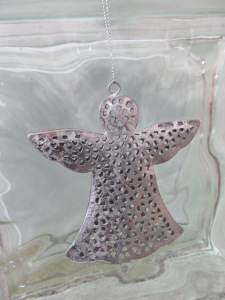
Image: D. Kirkup Designs
On my own path of creative experience, I find that in order for a story to take its fullest shape, which necessarily involves my coming to know what I haven’t seemed to know before, my mind must surrender. As it does this, almost like an observing dreamer, it seems to merge with, and serve, something else. I’ve yet to find words that describe this more completely than Albert Einstein’s:
���The intuitive mind is a sacred gift, and the rational mind is a faithful servant. We have created a society that honors the servant and has forgotten the gift.���
Just what would our world, and our lives, be like if we did remember that sacred gift, and the rational mind became able and willing, to serve it?
Perhaps that surrender that I experience, an easing up of the rational mind, with its “certainties” and limits, is what helped those study participants break through to a better-feeling place as they engaged in creative process.
What if the creative process itself is what helps us to remember that gift, and to treasure it, and remember just how it is meant to be served?

January 20, 2015
The foundation of all economics

Photo: D. Kirkup Designs
GLEANINGS FOR THE SPIRIT
A pure heart is as a mirror; cleanse it with the burnish of love and severance from all save God, that the true sun
may shine within it and the eternal morning dawn.
~ Bah�����u���ll��h
The source of crafts, sciences and arts is the power of reflection. Make ye every effort that out of this ideal mine there may gleam forth such pearls of wisdom and utterance as will promote the well-being and harmony of all the kindreds of the earth.
~ Bah�����u���ll��h

Photo: D. Kirkup Designs
True Economics ~ from a talk shared by ���Abdu’l-Bah�� in Boston, 1912:
Strive, therefore, to create love in the hearts in order that they may become glowing and radiant.�� When that love is shining, it will permeate other hearts even as this electric light illumines its surroundings.
When the love of God is established, everything else will be realized. This is the true foundation of all economics. Reflect upon it.
Endeavor to become the cause of the attraction of souls rather than to enforce minds. Manifest true economics to the people. Show what love is, what kindness is, what true severance is and generosity. This is the important thing for you to do.��
… Economic questions will not attract hearts. The love of God alone will attract them. Economic questions are most interesting; but the power which moves, controls and attracts the hearts of men is the love of God.

January 18, 2015
The cheeseburger that beat out prejudice
Prior to his deployment to Korea in the early 1950s, a friend named Bernie was on his way home one steamy Southern day. Just 19, he’d grown up in the North and had just completed basic training down South. He was eager to get home to see his family before shipping out overseas.
Dressed in his stiff khakis, he was waiting at a bus depot in South Carolina on a day of triple-digit temperatures. His starched collar was tight around his neck, and as he entered the depot, he looked longingly at the air-conditioned waiting room on one side of the building.
Then he turned toward the cramped, stifling room marked “Colored”, went in and politely ordered a cheeseburger at its small counter.
 The members of his family, like many African-Americans, had a wide range of skin colors because of a heritage of African, Native American, and European ancestry. The options this gave him as a light-skinned man were quickly brought to his attention when the man behind the counter leaned over to talk. The older man lowered his voice and told Bernie, “Now look, son, there’s no reason for you to get that nice uniform all messed up in here where it’s too hot to breathe. You’re serving your country; you deserve a break. Nobody here’s gonna know the difference if you go over there with the white folks and have your lunch where it’s cool. Go get comfortable before you take that long ride home,” he urged.
The members of his family, like many African-Americans, had a wide range of skin colors because of a heritage of African, Native American, and European ancestry. The options this gave him as a light-skinned man were quickly brought to his attention when the man behind the counter leaned over to talk. The older man lowered his voice and told Bernie, “Now look, son, there’s no reason for you to get that nice uniform all messed up in here where it’s too hot to breathe. You’re serving your country; you deserve a break. Nobody here’s gonna know the difference if you go over there with the white folks and have your lunch where it’s cool. Go get comfortable before you take that long ride home,” he urged.
The roomful of people grew quiet as Bernie thanked the man, then told him, “I’m happy to stay right here.” His reply drew warm smiles, nods, and “God bless yous” from around the room. He was enjoying the first few bites of his lunch when two white police officers strode into the room. The lively chatter instantly ceased as the two made their way toward Bernie.
He braced himself for whatever might be coming, then was completely surprised by the placating tone of the officer who did all of the talking. “Now son, you’ve obviously made a mistake. We know you’re probably not familiar with the way we do things around here. There’s no reason for you to stay here where you surely don’t belong. You just take your lunch there and come on over next door where you can be cool and comfortable.”
When Bernie started to explain that he was happy to stay where he was, the man behind the counter gave him a warning look. So Bernie stopped talking.
Then the police officer continued, “Now, we sure don’t want any trouble here, son. You’d best come with us and be with your kind, where you belong.” The policeman’s tone had grown much sterner, Bernie noticed, echoing through the complete silence in the room.��
The young soldier shrugged and rose to comply with the policeman’s request.The one who had done the talking stooped to lift Bernie’s duffel bag to his shoulder, and the other policeman carried Bernie’s plate and glass of milk carefully. Every set of eyes in the room was watching as the officers escorted the young black soldier as deferentially as if he were a visiting dignitary.
The most memorable moment came after the room’s double doors closed behind the three men. There was another beat of silence, and then the entire room broke into a chorus of delighted cheers and applause. Bernie, now a grandfather, says that he imagined that a great many of his ancestors were cheering right along with them.
 Adapted from Life at First Sight: Finding the Divine in the Details ���
Adapted from Life at First Sight: Finding the Divine in the Details ���
��
��


January 16, 2015
Hungry strangers in our own lives
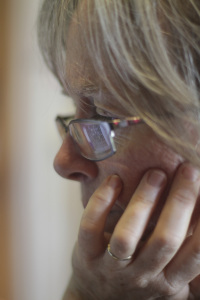 I read about hunger almost every day, lately, and attempt to write about it.
I read about hunger almost every day, lately, and attempt to write about it.
There was a lot of hunger, in a lot of places, before, during, and after the second World War. I have an abundance of primary-source information from people in my own life who have never forgotten what it feels like. Many of them paid a big price for it with their health, or lived in fear afterward with cupboards they can never empty before the contents spoil. From my earliest days, I listened to stories of what it feels like — what you feel like — when you don’t have enough to eat.

Photo: David Campbell
I wonder what those who sought to remake the world with justice after the war would think of where we find ourselves as a world today? There is still hunger. There is unbearable savagery. I would sum it up by saying there is a collective consciousness still too unconscious of the verity, value, and imperative of soulhood.
In fairness, it’s hard to remake a world in “justice” in the midst of unimaginable destruction. If you can only go on what you think you know about justice, what you think history and experience have shown it to be, well, the possibilities in such imitation are, inevitably, quite limiting. If you don’t know what the very purpose of justice is, it’s like traveling without a map, or even a polar star.
“The purpose of justice is the appearance of unity among men.” ~ Bah��’u’ll��h
Unambiguous, this declaration is. And doubtless, very difficult to conceptualize — and apply — if you operate only from what you believe you know about human beings, and potential, based on what you believe you know about human history and experience. 
As I continue to study the war that launched our world into entirely unimagined directions, many of which have congealed in blighted possibility, like plants insufficiently watered, I think I’m discovering what the root of all hunger really is. There is much we have not yet mined, nor learned, from “history” that often remains a narrow category deliberately designed to keep certain things in, and certain things out — essentially what has always led to violence of every kind.
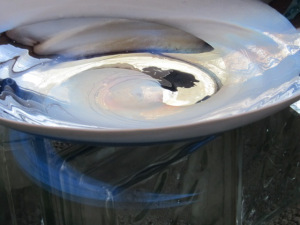
Photo: Diane Kirkup
But there is also a legacy that always outlasts that — a brilliant jewel of indestructible power whose facets reflect those qualities of justice and unity that Bah��’u’ll��h has pointed to. I believe that it is the only reason there is any possibility of either survival or advancement, just as I believe that humanity continues, if blindly, to let itself be convinced to treasure trash, while overlooking the one true treasure it has.
John O’Donohue has recognized what it is, and why it triumphs, and why we suffer so deeply — every kind of hunger we know — when we betray ourselves by depriving ourselves of it:
Our time is hungry in spirit. In some unnoticed way we have managed to inflict severe surgery on ourselves. We have separated soul from experience, become utterly taken up with the outside world and allowed the interior life to shrink.
Like a stream disappears underground, there remains on the surface only the slightest trickle. When we devote no time to the inner life, we lose the habit of soul. We become accustomed to keeping things at surface level.
The deeper questions about who we are and what we are here for visit us less and less. If we allow time for soul, we will come to sense its dark and luminous depth. If we fail to acquaint ourselves with soul, we will remain strangers in our own lives.����
~ John O’Donohue


